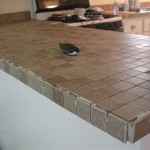Can You Tile Directly On Concrete Basement Floor?
Tiling a concrete basement floor can be a great way to improve its appearance and make it more comfortable and durable. However, it is important to do it properly to avoid problems down the road. One of the most important things to consider is whether or not you can tile directly on the concrete. The answer to this question depends on a number of factors, including the condition of the concrete, the type of tile you are using, and the adhesive you are using.
Condition of the Concrete
The first thing to consider is the condition of the concrete. If the concrete is in good condition, with no cracks or other damage, then you may be able to tile directly on it. However, if the concrete is cracked or damaged, you will need to repair it before you can tile. Cracks can be filled with a concrete patching compound, and other damage can be repaired with a concrete resurfacing product.
Type of Tile
The type of tile you are using is also important to consider. Some types of tile, such as ceramic and porcelain, can be installed directly on concrete. However, other types of tile, such as natural stone and marble, require a backer board to be installed first. A backer board is a thin sheet of material that is placed between the concrete and the tile to provide a smooth and even surface for the tile to adhere to.
Adhesive
The adhesive you are using is also important to consider. Some adhesives are designed to be used with concrete, while others are not. It is important to choose an adhesive that is compatible with the type of concrete you are using and the type of tile you are installing. Using the wrong adhesive can cause the tile to fail.
Preparing the Concrete
Once you have considered all of these factors, you can begin preparing the concrete for tiling. The first step is to clean the concrete. This can be done with a broom or a vacuum cleaner. Once the concrete is clean, you need to etch it. Etching is a process of roughening the surface of the concrete so that the adhesive will bond better. You can etch the concrete with a muriatic acid solution or a commercial etching product.
Installing the Tile
Once the concrete is prepared, you can begin installing the tile. The first step is to apply the adhesive to the concrete. You can do this with a trowel or a notched trowel. Once the adhesive is applied, you can place the tile on the concrete. Be sure to press the tile firmly into the adhesive to ensure a good bond. Once the tile is installed, you need to grout the joints between the tiles. Grout is a thin paste that is used to fill the gaps between the tiles and to seal them. Grout comes in a variety of colors, so you can choose a color that matches the tile.
Conclusion
Tiling a concrete basement floor can be a great way to improve its appearance and make it more comfortable and durable. However, it is important to do it properly to avoid problems down the road. By following the steps outlined in this article, you can ensure a successful tile installation.
:max_bytes(150000):strip_icc()/can-you-install-tile-directly-on-concrete-1822600-04-458f7bb6c78348c1835cf8054ef36553.jpg?strip=all)
How To Install Tile Over Concrete

How To Install Tile Over Concrete Greenbuildingadvisor
How To Tile Onto Concrete Floors Porcelain Super

How To Tile A Concrete Basement Floor The Grout Medic
:max_bytes(150000):strip_icc()/can-you-install-tile-directly-on-concrete-1822600-01-8a89ceab1a274fb8ac81890ab7fc6b1b.jpg?strip=all)
How To Install Tile Over Concrete

Can I Tile Over Concrete

How To Install Tile In A Basement Washroom Floor On Concrete Like Pro Start Finish

Thermaldry Basement Flooring Systems Waterproof

Concrete Basement Floor Tiling Preparation

Tile Over Concrete Subfloor An Easy Diy Tutorial
Related Posts








